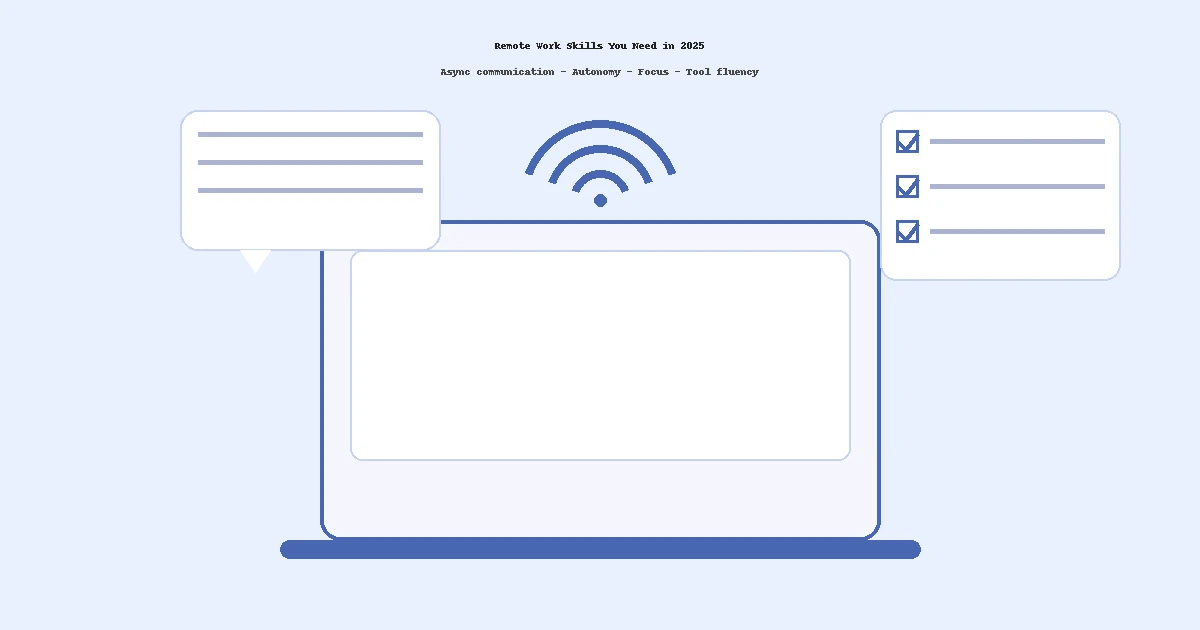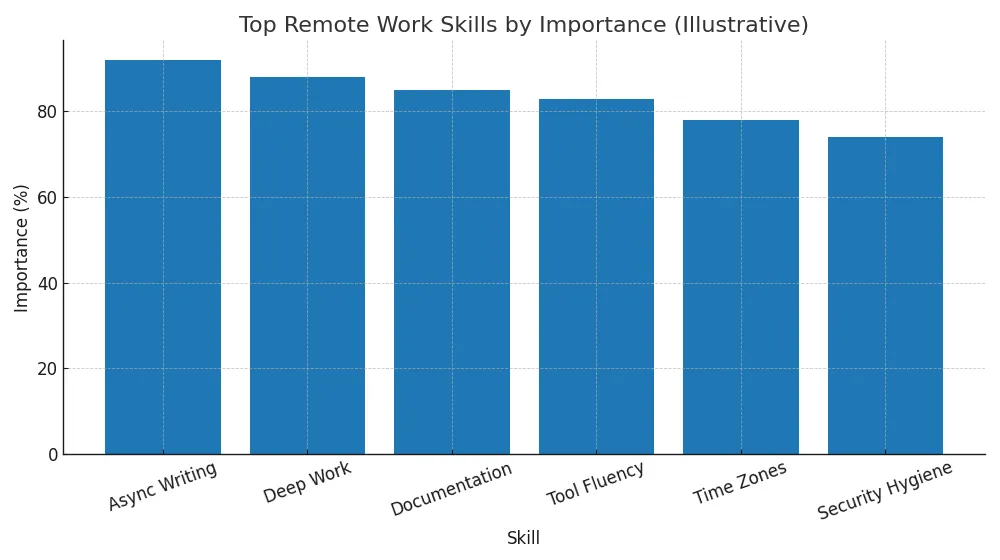Remote Work Skills You Need in 2025: A Practical Guide

Remote work is the new normal, but the people who thrive in 2025 aren’t just working from home—they’ve mastered a set of remote-first skills that increase impact, trust, and career growth. This practical guide covers the core competencies you need to stand out: asynchronous communication, deep work, documentation, tool fluency, time zone collaboration, and security hygiene. You’ll get playbooks, examples, and a 30–60–90 day plan to level up fast.
Why Remote Work Skills Matter for Your Career
Distributed teams reward clarity, reliability, and visible outcomes. When you write clearly, design your day for focus, and document decisions, you reduce friction for everyone—and make your work easy to promote. Managers notice teammates who simplify async coordination and ship results on schedule. These skills compound into faster promotions, stronger references, and higher compensation (see salary negotiation tactics for converting impact into pay).
1) Asynchronous Communication (Write to Move Work Forward)
Async is not just “sending messages.” It’s writing for decisions. Use clear structure, link context, and propose next steps so teammates can respond without a meeting.
- Structure: Background → Proposal → Options → Decision needed by [date].
- Atomic updates: One topic per message/thread; title with a verb and topic.
- Link sources: docs, data, dashboards; avoid screenshots of text.
Template: “We observed [signal]. I propose [action] to achieve [goal]. Options: A/B with trade-offs below. Unless there’s a blocking concern by Friday 5pm, I’ll proceed with A.”
2) Deep Work (Protect Your Focus Windows)
Distraction kills remote output. Build two 90-minute focus blocks daily. Silence notifications, close chat, and batch messages afterward. Track one metric that reflects output (e.g., shipped tickets, pages written, SQL merged). Over time, your calendar becomes a production engine instead of a meeting graveyard.
- Schedule focus blocks when your energy peaks.
- Quit apps that are not needed; use “Do Not Disturb.”
- Keep a “parking lot” note for ideas to revisit later.
3) Documentation (Make Decisions Discoverable)
Good docs replace status meetings. Aim for short, living documents—one page per decision or project area with links out to details. Every page answers: what changed, why it matters, who’s responsible, and what’s next. Organize docs by team and topic so new teammates can self-serve answers.
- Changelog first: start each doc with “What’s new this week.”
- Owner + SLA: list the person and update cadence (e.g., weekly).
- Templates: PRD, incident retro, launch checklist, onboarding runbook.
4) Tool Fluency (Master a Lean Stack)
Remote work rewards people who pick the right tool for the job and keep data tidy. Learn hotkeys, automate repetitive tasks, and standardize naming so everyone finds things faster.
| Use Case | Primary Tool | Good Practice |
|---|---|---|
| Async updates | Docs/issue tracker | Actionable titles; link to sources |
| Meetings | Video + agenda doc | Agenda sent 24h before; notes after |
| Project status | Kanban or roadmap tool | Weekly groom; clear owners |
5) Time Zone Collaboration (Design for Follow-the-Sun)
Assume teammates read your message while you sleep. Leave everything needed to act: context, instructions, and fallback options. Use handoff notes at the end of your day; ask for specific outcomes instead of “thoughts?” And keep a shared calendar of office hours to reduce back-and-forth.
6) Security Hygiene (Protect Access While Working Anywhere)
Security is part of remote professionalism. Use a password manager, 2FA, and device encryption; lock screens in public places. Be careful with links and attachments. Store work data only in approved tools—no personal drives. Security is everyone’s job.
Illustration: Which Skills Matter Most?

30–60–90 Day Plan to Upgrade Your Remote Game
Days 1–30: Stabilize and Create Focus
- Block two daily focus windows; mute non-essential notifications.
- Adopt a weekly planning ritual: goals, priorities, and demo dates.
- Standardize your async update template for status and proposals.
Days 31–60: Document and Automate
- Create one-page docs for your core projects (owner, goals, links, changelog).
- Automate a repetitive task (shortcut, macro, or script).
- Clean your file structure and naming conventions for discoverability.
Days 61–90: Scale Impact
- Run a cross-time-zone pilot with clear handoffs.
- Publish a shared playbook (e.g., onboarding or launch checklist).
- Measure outcomes: faster cycle times, fewer meetings, clearer decisions.
Real-World Examples (Copy These)
- Async status post: “Week of 8/04 — shipped X; blocked by Y; next: Z (ETA Fri). Links: [doc] [dashboard]. Decision needed: approve A by Thu.”
- Deep work habit: “No meetings 9–11am; Slack summary at 11:05.”
- Doc template: Problem → Hypothesis → Plan → Metrics → Risks → Decision.
Connect Skills to Pay and Roles
Remote excellence is marketable. Translate outcomes into your resume (see resume guide) and promotion packet: fewer handoffs, faster shipping, clearer decisions. In interviews (interview guide), tell stories that start with a problem and end with a measurable result. As you grow, invest in high-income skills and align money with goals using a simple budget.
FAQ: Remote Work Skills
Do I need fancy tools to be effective remotely?
No. Start with a lean stack used well. Clear writing, focus habits, and documentation beat tool sprawl.
How do I avoid constant meetings?
Move status to async posts, keep meetings for decisions, and send agendas 24 hours in advance with a clear “decision needed” line.
What if my team resists async?
Pilot a small process change for one project, measure cycle time/satisfaction, and share results. Success wins adoption.
How can I show impact remotely?
Ship visible artifacts weekly: demos, docs, dashboards. Tie outcomes to metrics and share summaries with stakeholders.
What skills lead to promotions?
Async writing, deep work, and documentation—combined with consistent outcomes—make managers’ jobs easier. Then expand scope to cross-team wins.
Bottom Line
Remote work in 2025 rewards clear writing, deep focus, and discoverable decisions. Build these skills with a simple 90-day plan and measure the impact. As your outcomes compound, so do your opportunities—and your compensation. Learn more with our free resources and take your next step today.